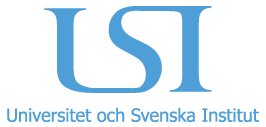During the fall of 2006 representatives from five Swedish universities gathered to discuss possible ways of cooperating with the Swedish Mediterranean Institutes. This is how USI, Universities in cooperation for internationalization, was born. The first chairperson of the network was Eva Wiberg, professor in Italian and vice-chancellor at Lund University.
The start-up was partially funded by The Swedish Foundation for International Cooperation in Research and Higher Education (STINT). The funding was granted for three years to help form the network and the courses offered. Thereafter the network has been funded by the Swedish universities.
It All Started with Master’s Courses
The initial focus of the network was to offer master’s courses. The university reform known as the Bologna reform had recently been implemented in Sweden and there was a great desire to make Swedish higher education more international. The idea was to offer cross-disciplinary Master’s courses with field studies in the Mediterranean region, open for applications for everyone with a bachelor’s degree. Together with the directors at the Swedish Institutes the universities designed courses with the aim of using the expertise at the universities and institutes in the best way possible. The first course was launched in 2008.
The Introduction of Research Seminars
After an initiative from the Swedish Institute in Alexandria, in 2011, USI started to organize research seminars to promote the exchange between Swedish researchers and their counterparts in the Mediterranean region. The Swedish Institute in Alexandria has as one of its main objectives to work with democracy issues and the first seminar was “Creating Confidence and Democracy in Previous Autocracies”. At the time Egypt found itself in the middle of the Arab Spring and the need to discuss these matters was urgent. So far, USI has organized four research seminars on different topics.
Throughout the years USI has come to build relations with several universities in the region, researchers has come to Sweden as guest professors and a large number of the students have gone on to doctoral studies after their master’s. USI is nowadays also an important part of the Swedish Mediterranean Institutes.









